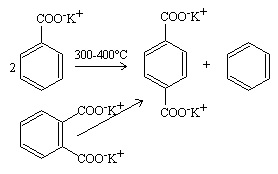What is Henkel reaction?
The Henkel reaction, which is also referred to as the Raecke process, is an industrial-scale chemical transformation involving the thermal rearrangement or disproportionation of alkaline salts derived from aromatic acids. This process occurs in the presence of metallic salts, such as cadmium, and results in the formation of symmetrical diacids.

References
- B. Raecke, “Verfahren zur Herstellung von Terephthalsaeure” [Process for the preparation of terephthalic acid] DE 936036 (1952) to Henkel & Co.
- B. Raecke, “Verfahren zur Herstellung von Terephthalsaeure bzw. deren Salzen bzw. deren Derivaten aus Kaliumbenzoat” [Process for the preparation of terephthalic acid or salts thereof or derivatives thereof from potassium benzoate] DE 958920 (1952) to Henkel & Co.
Full Professor of Organic Chemistry at the University of Granada, with a long-standing research career in Computational Chemistry and molecular modeling and design.